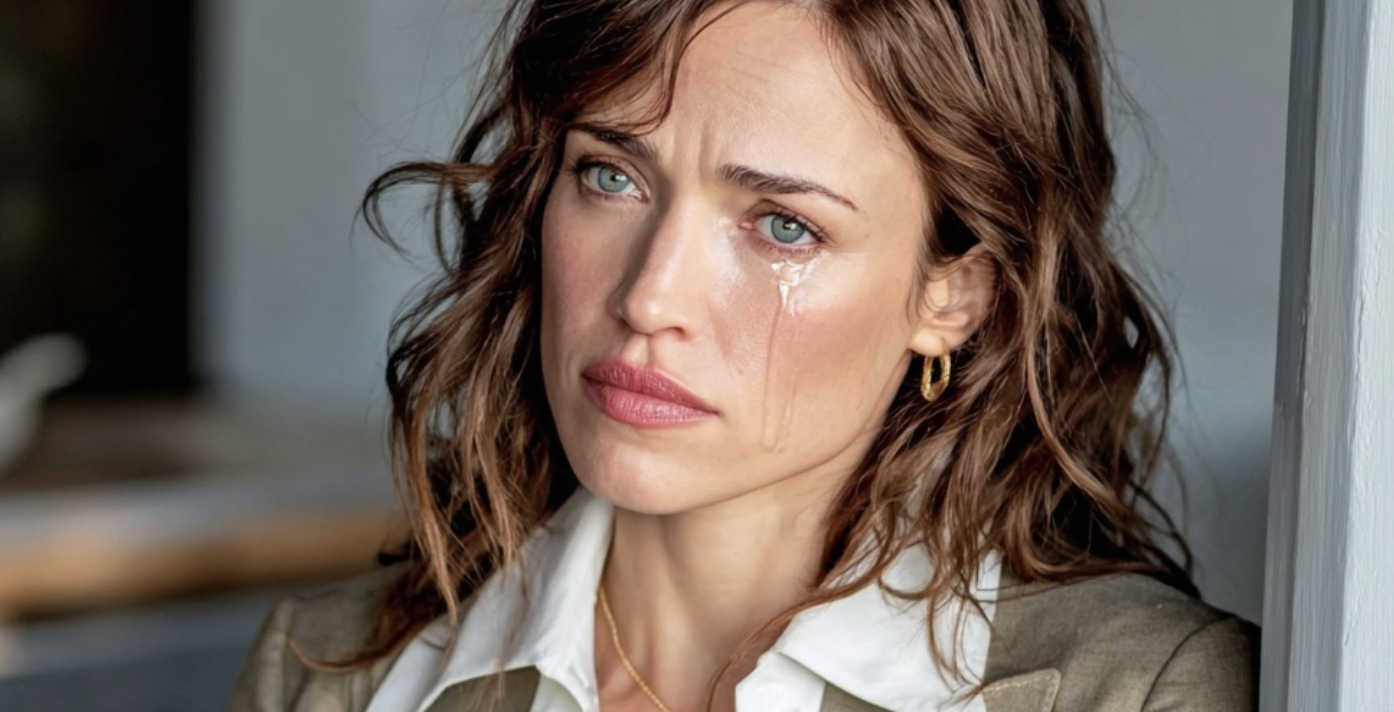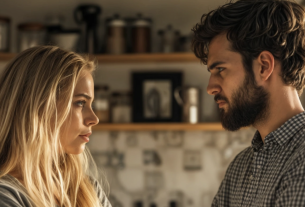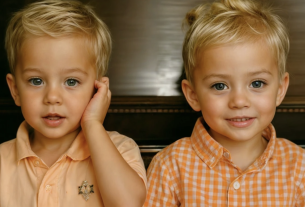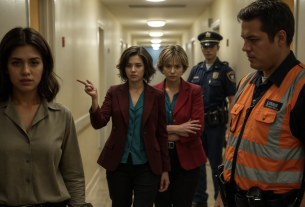“Sign it, Kseniya Arkadyevna, and let’s put an end to this farce.”
Rodion carelessly slid a folder of documents toward me. His well-groomed fingers drummed on the mahogany desk, and that same smirk I’d come to hate over the years played on his lips.
The smirk of a predator cornering its prey.
“What is this?” I didn’t touch the papers, feeling everything inside me tighten into an icy knot.
“My parting gift. Six ares in some backwater called Verkhnie Klyuchi—‘Upper Springs.’ A weed-choked plot, a crooked shed, and a collapsed well. Everything you deserve.”
He leaned back in his embossed leather chair, savoring the moment. Savoring the humiliation he had staged with particular cynicism.
“And this…” he nodded at the documents, “consider it compensation for your best years. You can plant radishes.”
If anything grows in that clay, of course.
His voice oozed barely concealed contempt. He expected tears, hysterics, a scene.
He expected me to argue, to haggle for his scraps, to cling to the familiar life he was taking away with a single stroke of his pen.
I simply picked up the pen. He hadn’t expected that.
“The children stay with me,” my voice came out even, without a tremor. It was my one condition. My red line.
His face twisted for a moment. The children were the only thing that could pierce his armor, but not out of love.
They were his status, his extension, a pretty picture for society. And they despised him, and he knew it.
“As you wish. The village will suit them. Fresh air and an outhouse in the yard. Builds character.”
I calmly put down my signature: Voronova, Kseniya Arkadyevna. Soon just Voronova.
I took the folder and stood up. Not another word. Not a single glance in his direction.
The door to his office slammed behind me, cutting off fifteen years of my life.
That evening, while I was sorting the papers, the children peeked into the room. The twins, Lyova and Polina—my thirteen-year-old defenders.
“Mom, is that from him?” Polina nodded at the documents with the official seals.
“Yes. This is our new home.”
I unfolded the plot plan. A crooked rectangle marked “agricultural land.” In the center—a blue circle labeled “well.”
Lyova frowned.
“Are we really moving there? Away from… him?”
“Yes,” I said firmly. “We’re starting over from scratch.”
On my laptop I opened a satellite map. A tiny green speck in the middle of fields and forests. Verkhnie Klyuchi.
Zoomed in, you could make out a dark hole in the middle of the overgrown plot. The old well.
Rodion thought he’d exiled me to poverty, to a penal settlement. He sneered as he left me that “useless” dacha lot.
He had no idea what secret that abandoned land might hold. And somehow I felt that there, in that wilderness, my true lucky ticket was hidden.
Not in an apartment overlooking central Moscow, but down there, at the bottom of an old, abandoned well.
Reality proved harsher than any satellite image. Verkhnie Klyuchi greeted us with sagging fences and empty streets.
Our plot was the last one, right by the forest. Weed growth as tall as a person hid everything but the shed’s rusty roof.
“Whoa,” Lyova breathed, surveying our new domain. “We’re gonna need a machete.”
Polina swallowed, then shook her head resolutely.
“It’s okay, Mom. We’ll manage. What matters is we’re together and he isn’t here.”
We rented a small house on the next street for the time being. The landlady, a tiny, wiry old woman, swept us with a sharp look.
“The sixth plot, is it? Prokhorov’s?” she clarified. “Bad place. He kept digging and digging for something there. He was a geologist—odd sort. Left about ten years ago, then they said he died. Since then the land’s stood ownerless.”
That evening the phone rang. Rodion.
“Well, plantation queen? How do you like your estate? Have the kids made friends with the local fauna yet? Any vipers out there?”
His voice dripped with poisonous honey.
“We’re doing great, Rodion. The air is wonderful.”
I tried to speak calmly and evenly, giving him no fuel for further mockery. But he was a master of psychological pressure.
“I worry, Ksyusha. You understand the children need normal conditions. Internet, school, peers. Not this… primitive commune. It’s irresponsible of you.”
I closed my eyes. He hit me right where it hurt—my fear as a mother.
“I can fix everything. One call from you,” he lowered his voice, making it insinuating. “Admit you were wrong, that this is a mistake. I’ll send a car.”
It was his favorite trick: make me out to be flighty, incapable of sound decisions, then swoop in as savior.
“We don’t need your car. Or your help.”
“As you wish. Just don’t go whining to Child Services later, when they come to check the conditions you’re keeping my children in.”
He hung up.
My hands were shaking. I stepped out onto the porch. The air was cool and clean, smelling of grass and forest. But Rodion’s words spread a sticky poison over everything.
The next day we started clearing the plot. The work was brutal. Thorny thickets, nettles, roots that looked like snakes. By noon we reached the shed.
Inside, among old junk, I found a rotted wooden crate. Inside lay yellowed papers: a plan of the plot, far more detailed than the official documents, and several notebooks filled with tight handwriting.
They were Prokhorov’s diaries—the geologist himself.
And in the very center of the plot, freed from the weeds, it stood. The well.
It wasn’t falling apart, as Rodion had said. A sturdy crib of oak darkened by time, a massive windlass, a heavy wooden lid.
Lyova and I struggled to lift it. A black, damp void sank away below.
“Mom, it’s deep,” Lyova said after dropping in a small stone.
We never heard it hit.
Right then, staring into that bottomless black, I realized Rodion had miscalculated. He thought he’d thrown me into a pit.
He’d given me a key. And I was ready to turn it, whatever it cost me.
Night after night I pored over Prokhorov’s diaries by the light of a dim lamp. The notebooks smelled of dust and damp earth.
Beneath the geological terms, stratigraphic diagrams, and calculations, something else bled through: an obsession.
Prokhorov hadn’t been looking for water. He hadn’t built a well at all, but a shaft—a secret cache. On one page I stumbled upon a phrase circled in red: “Depth 17. False casing. Main cargo lower.”
And next to it a note: “Ownership of the land equals ownership of its subsoil. Double-checked with lawyers; the paper with the opinion is enclosed. Notary certified. Mine means mine. Forever.”
In the morning, an unfamiliar car drove onto the plot. Right behind it—a gleaming black SUV: Rodion.
He hadn’t lied.
Two women in severe suits stepped out of the first car. Out of the second—him. Smug, sure of his victory.
“Kseniya Arkadyevna? Child Protective Services,” one of the women introduced herself. “We received a report about inadequate living conditions for minors.”
Lyova and Polina, streaked with dirt, froze behind me. I saw fear harden in their eyes.
“Look,” Rodion swept his arm to take in our cleared patch of earth. “A shed about to collapse. An overgrown field. Sanitary facilities, as I understand it, in the woods. Is this a life for the children of a successful man?”
He reveled in his rightness, his power. He hadn’t come just to humiliate me—he’d come to take the children, to break me completely.
At that very moment, something happened. Years of humiliation, fear, and trying to be “good” and “convenient” compressed to a single point—and snapped.
Enough. That’s it.
I looked at frightened Polina, at Lyova with his fists clenched. And for the first time in fifteen years I looked at Rodion without a trace of fear.
“Ladies,” I turned to the women, my voice calm and businesslike. “You are not looking at a neglected lot but at a capital investment asset. I am bringing into order property that came to me under a contract.”
Rodion snorted.
“What property? It’s a dump!”
“This is land with a unique geological feature,” I ignored him. “The previous owner, the geologist Prokhorov, conducted surveys here. The ‘well,’ as you call it, is in fact a reinforced shaft.”
I walked up to the timbering and rapped on it.
“This is bog oak. Practically eternal.”
The Child Services workers glanced at each other. My confident tone threw them off.
“I have a request. I need help from two men—literally ten minutes—to demonstrate this asset’s value.”
I looked over at our neighbor, Stepan, who happened to be fussing with his fence and watching with interest. He nodded. The second was Rodion’s driver, whom Rodion waved over irritably.
We secured a powerful flashlight and a long rope with a hook—both found in the shed—to the windlass.
“Seventeen meters,” I instructed Stepan, who took hold of the handle.
The rope crept downward, unwinding with a creak. The light washed over damp, mossy walls.
“Stop!” I shouted. “Now a little to the left. There should be a niche.”
Stepan twisted the handle slightly. A dull thud sounded.
“Got it!” he yelled. “Hooked something!”
“Pull! Carefully!”
The two of them began to turn the handle, slow and straining. From the dark maw of the well emerged something rectangular, sheathed in darkened copper. A small chest, bound with metal.
I took a pry bar and knocked off the rusted lock. Lifted the lid.
Everyone nearby gasped.
Inside, on a lining of decayed velvet, dull gleams flashed—gold bars.
Rodion was the first to come to. His face went from smug to crimson, then ashen gray.
“That… that’s mine!” he croaked, stepping toward the chest. “You got the land from me, which means all of this is mine!”
Lyova instinctively stepped between him and the chest.
I looked at my ex-husband calmly. At the man who had considered me his property and now tried to claim what he himself had discarded.
“You’re mistaken, Rodion. This is mine.”
I took a folded document from my pocket—the very property division agreement.
“There’s your signature. You voluntarily transferred full and undivided ownership of this plot of land to me. With all structures and—” I paused, looking him straight in the eye, “with all of its contents.”
The Child Services women were silent, turned into spectators.
“And this,” I raised Prokhorov’s old notebook, “is the previous owner’s diary. There’s a note here, notarized thirty years ago: ‘Ownership of the land equals ownership of its subsoil; a portion already paid to the state.’ The law is on my side, Rodion. Your greed and your contempt worked against you.”
His face contorted in a grimace of impotent rage. He’d been so eager to destroy me, so quick to be rid of the “dead weight,” that he’d handed me a fortune.
“I’ll sue!” he squealed. “I’ll prove you deceived me!”
“Go ahead,” I shrugged. “Tell the court how you tried to dump your ex-wife and children into poverty and accidentally made us rich. I think they’ll find that an amusing story.”
I turned to the Child Services workers.
“As you can see, the conditions for the children here are more than promising. We’re planning to build a large house. So the report you received was false. Good day.”
Muttering something, they hurried to their car and left.
Rodion was left alone. Humiliated. Crushed. His driver and our neighbor Stepan looked at him without the slightest sympathy. He was a laughingstock.
He turned and, without another word, slunk to his car like a beaten dog.
When his SUV disappeared around the bend, Polina ran up and hugged me tight.
“Mom, you’re so strong!”
I looked at my children, at the overgrown plot, at the old well that had guarded a treasure—and understood that the real treasure wasn’t in that chest. It was that on this day I finally found myself.
A year passed. Where the weeds had been, a big, light-filled house now stood. We restored the old well, sealed it with strong glass, and made it the centerpiece of the landscaping—like a monument to the start of our new life.
The children went to the local school and made friends. Lyova got into geology, and Polina took up horseback riding. They were happy.
Sometimes calls came in from unfamiliar numbers. I knew who it was. I never answered. The past should stay in the past—especially the part that tried to bury you.
Three years went by. Our home in Verkhnie Klyuchi became the coziest place on earth. The apple trees we planted that first spring had already borne their first crop.
I invested part of the money from the find back into the village—we renovated the old community hall, turning it into a children’s activity center, and helped restore the farm, giving neighbors jobs.
People stopped seeing me as an eccentric summer resident. I became one of their own: Kseniya Arkadyevna, who could help pull a tractor out of the mud and also give sound business advice.
The children grew up. Inspired by Prokhorov’s story, Lyova was seriously preparing to apply to the geology faculty. He combed every nearby forest and built an entire mineral collection.
Polina found her path in veterinary work, helping at the farm and treating all the village cats and dogs.
They no longer thought about our former life; their father’s barking orders and constant dissatisfaction were far away, like a bad dream.
One autumn evening, an old rattling taxi pulled up to our gate. Rodion got out.
I didn’t recognize him at first. The expensive suit had been replaced by a worn jacket, his face had grown gaunt, and gray streaks threaded his hair. The sleek self-assurance was gone without a trace. He stood shifting from foot to foot, unable to step inside.
I stepped onto the porch. We looked at each other in silence.
“I… Ksyusha, I’ve lost everything,” he managed. “Partners cheated me, the business collapsed. The apartment was taken for debts. I have nowhere to live.”
He looked at me hopefully—the way a drowning man looks at a life preserver. He hadn’t come to ask forgiveness. He had come to demand help, as he always had—only now from a position of weakness.
“What do you want from me, Rodion?”
“Let me stay. For a while. I’m the father of your children, after all.”
At that moment Lyova and Polina came out of the house. They stopped behind me. There was no hatred or gloating in their eyes. Only a cool, detached curiosity—the way you look at a stranger.
“You weren’t a father to us,” Lyova said evenly. “You were an owner. And when a thing breaks, you throw it out. You taught us that yourself.”
Rodion shrank. He looked to me for support.
“There’s nothing of yours here,” I said calmly. “You chose to leave with nothing. You gave it all away yourself.”
I took a few bills from my pocket and held them out.
“This is for a taxi back. And don’t ever come here again. You’re not welcome.”
He took the money; his fingers trembled. He turned and walked to the car without a word.
I watched him go and felt nothing. No pity, no satisfaction. Just emptiness. He had simply ceased to exist for me.
I hugged the children and looked at our well beneath the glass. Its dark depth no longer seemed frightening.
It had become a symbol: sometimes you have to hit bottom to push off and rise higher than you ever imagined. And the treasure it guarded wasn’t gold.
It was the chance to build a life on our own terms.



